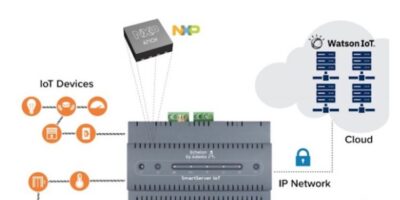Adesto Technologies, IBM and NXP Semiconductors believe they have demonstrated “a new level of security for smart building and industrial IoT (IIoT) deployments”. Adesto’s SmartServer IoT edge server and the IBM Watson IoT platform, enabled by NXP’s A71CH secure element for IoT devices, provide an extra layer of security for businesses connecting their systems securely to the IBM Cloud, say the partners.
The IBM Watson IoT platform is a managed, cloud-hosted service designed to enable companies to quickly connect and derive value from their IoT devices. It enables organisations to capture and explore data to drive informed decision-making.
Adesto’s open, extensible SmartServer IoT simplifies interoperability between the diverse set of legacy systems, disparate devices, and the numerous protocols – traditional and emerging – in industrial and building automation. It provides built-in device and data management for sensors, meters, actuators and controllers through a growing range of protocols including BACnet, LonWorks and Modbus.
NXP’s A71CH provides a chip-level root of trust. Through integration with SmartServer IoT, it enables additional security when customers connect buildings to Watson without exposing keys for the lifetime of a device.
NXP’s A71CH Plug & Trust Secure Element has X.509 certificates and keys trusted by Watson, injected at NXP secure certified facilities. NXP’s trust provisioning service safeguards keys and credentials are injected in a trusted environment. When embedded into devices, the chips have the necessary keys to establish a secure TLS connection with IBM Watson IoT enabling seamless device-to-cloud connections.
The three companies will be highlighting the joint solution at the IBM IoT Exchange in Orlando Florida.





